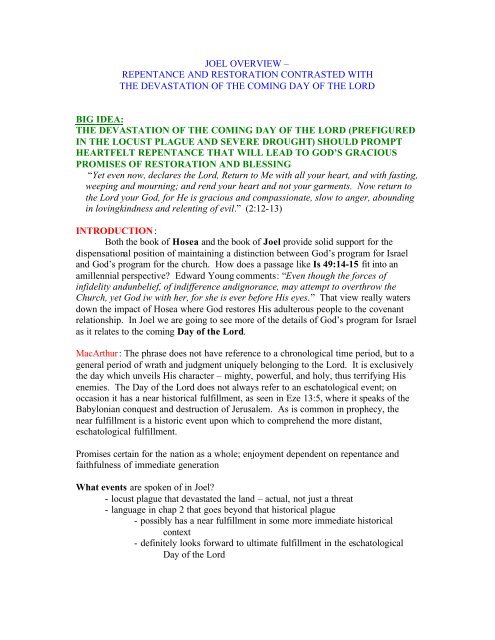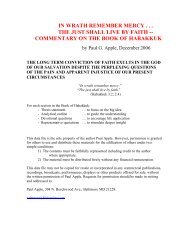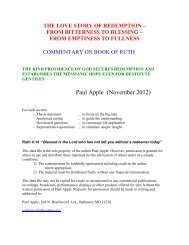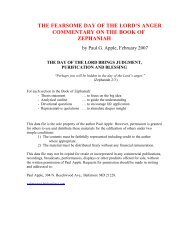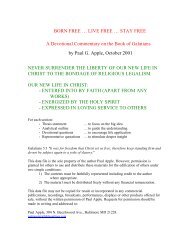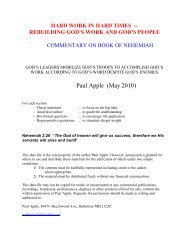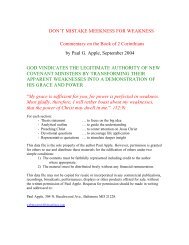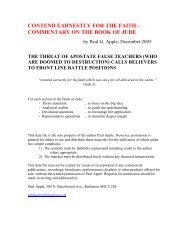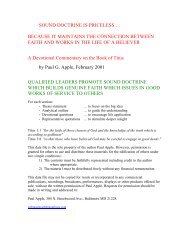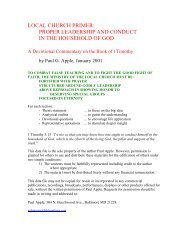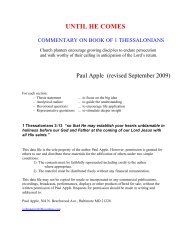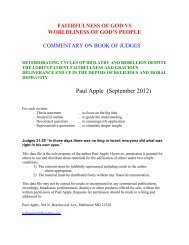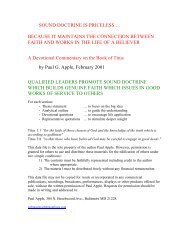Joel - Free sermon outlines, Bible study and
Joel - Free sermon outlines, Bible study and
Joel - Free sermon outlines, Bible study and
- No tags were found...
You also want an ePaper? Increase the reach of your titles
YUMPU automatically turns print PDFs into web optimized ePapers that Google loves.
JOEL OVERVIEW –REPENTANCE AND RESTORATION CONTRASTED WITHTHE DEVASTATION OF THE COMING DAY OF THE LORDBIG IDEA:THE DEVASTATION OF THE COMING DAY OF THE LORD (PREFIGUREDIN THE LOCUST PLAGUE AND SEVERE DROUGHT) SHOULD PROMPTHEARTFELT REPENTANCE THAT WILL LEAD TO GOD’S GRACIOUSPROMISES OF RESTORATION AND BLESSING“Yet even now, declares the Lord, Return to Me with all your heart, <strong>and</strong> with fasting,weeping <strong>and</strong> mourning; <strong>and</strong> rend your heart <strong>and</strong> not your garments. Now return tothe Lord your God, for He is gracious <strong>and</strong> compassionate, slow to anger, aboundingin lovingkindness <strong>and</strong> relenting of evil.” (2:12-13)INTRODUCTION:Both the book of Hosea <strong>and</strong> the book of <strong>Joel</strong> provide solid support for thedispensational position of maintaining a distinction between God’s program for Israel<strong>and</strong> God’s program for the church. How does a passage like Is 49:14-15 fit into anamillennial perspective? Edward Young comments: “Even though the forces ofinfidelity <strong>and</strong>unbelief, of indifference <strong>and</strong>ignorance, may attempt to overthrow theChurch, yet God iw with her, for she is ever before His eyes.” That view really watersdown the impact of Hosea where God restores His adulterous people to the covenantrelationship. In <strong>Joel</strong> we are going to see more of the details of God’s program for Israelas it relates to the coming Day of the Lord.MacArthur: The phrase does not have reference to a chronological time period, but to ageneral period of wrath <strong>and</strong> judgment uniquely belonging to the Lord. It is exclusivelythe day which unveils His character – mighty, powerful, <strong>and</strong> holy, thus terrifying Hisenemies. The Day of the Lord does not always refer to an eschatological event; onoccasion it has a near historical fulfillment, as seen in Eze 13:5, where it speaks of theBabylonian conquest <strong>and</strong> destruction of Jerusalem. As is common in prophecy, thenear fulfillment is a historic event upon which to comprehend the more distant,eschatological fulfillment.Promises certain for the nation as a whole; enjoyment dependent on repentance <strong>and</strong>faithfulness of immediate generationWhat events are spoken of in <strong>Joel</strong>?- locust plague that devastated the l<strong>and</strong> – actual, not just a threat- language in chap 2 that goes beyond that historical plague- possibly has a near fulfillment in some more immediate historicalcontext- definitely looks forward to ultimate fulfillment in the eschatologicalDay of the Lord
I. (1:1-20) DEVASTATION -- THE DEVASTATION OF THE IMMEDIATELOCUST PLAGUE AWAKENS WEEPING AND WAILING AND CRYINGOUT TO GODA. (:1-3) Devastation Unparalleled1. (:1) Introduction of the Prophet = <strong>Joel</strong>“The word of the Lord that came to <strong>Joel</strong>, the son of Pethuel”Historical Context / Dating Issues:Constable: some scholars advocate an early pre-exilic date during the reign of KingJehoshaphat (872-848 B.C.) or possibly his gr<strong>and</strong>son, King Joash (835-796 B.C.).Arguments in favor of this period include the position of <strong>Joel</strong> in the Hebrew canon; itappears among other prophetic writings of this period. Also the enemies of Israel that<strong>Joel</strong> named (Tyre, Sidon, Philistia [cf. 2 Chron. 21:16-17], Egypt [cf. 1 Kings 14:15-16], <strong>and</strong> Edom [cf. 2 Kings 8:20-22]; 3:2-7, 19) were enemies of Israel during this time.The prominence <strong>Joel</strong> gave to Judah's priests <strong>and</strong> elders rather than to her king—Joashwas a boy king under the influence of Jehoiada, the high priest, early in his reign—is afurther argument for this view.http://www.soniclight.com/constable/notes/pdf/joel.pdfAmos 4:9 with dating reference to Uzziah, king of Judah in 1:1 = more of a mid preexilicdate (early eighth century)2. (:2A) Call for Attentiona. Directed to the Leaders“Hear this, O elders”b. Directed to the People“And listen, all inhabitants of the l<strong>and</strong>”Devastation targeted against the l<strong>and</strong> which is the source of allmaterial prosperity in their agrarian culture3. (:2B) Uniqueness of the Devastation – extent, severity …“Has anything like this happened in your daysOr in your fathers’ days?”4. (:3) Testimony to Succeeding Generations“Tell you sons about it,And let your sons tell their sons,And their sons the next generation.”B. (:4) Devastation Described = from Surprising Enemy -- Four Waves of LocustAttacks(Different types of locusts or describing waves of attacks)1. Army of Gnawing Locusts“What the gnawing locust has left, the swarming locust has eaten”
2. Army of Swarming Locusts“What the swarming locust has left, the creeping locust has eaten”3. Army of Creeping Locusts“What the creeping locust has left, the stripping locust has eaten”4. Army of Stripping LocustsC. (:5-13) Devastation Lamented1. (:5-7) Lamented by Wine Loversa. 2 Different Categories1) Alcoholics – Using wine as an Escape“Awake, drunkards, <strong>and</strong> weep”2) Sophisticated Pleasure Seekers“And wail, all you wine drinkers”b. Same Deprivation“On account of the sweet wine that is cut off from your mouth.”Nothing wrong with drinking the fruit of the vineWood: called attention not only to the debased nature of society but to the people’sinsensitivity to their own condition, a moral decadence that if unchecked would bringon national disaster. Times of ease too often result in dissipation.2. (:8-9) Lamented by Worship Leadersa. Untimely Deprivation“Wail like a virgin girded with sackclothfor the bridegroom of her youth.”Constable: The next entity called to mourn appears to be Jerusalem. The gender of"Wail" is feminine (singular), <strong>and</strong> Jerusalem is often compared to a virgindaughter in the Old Testament (e.g., 2 Kings 19:21; Lam. 1:15; cf. <strong>Joel</strong> 2:1, 15, 23, 32).b. Cessation of Sacrifices“The grain offering <strong>and</strong> the drink offering are cut offFrom the house of the Lord.The priests mourn, the ministers of the Lord.”3. (:10-12) Lamented by Working Laborers – in the farms <strong>and</strong> vineyards <strong>and</strong>orchards“The field is ruined, the l<strong>and</strong> mourns;For the grain is ruined, the new wine dries up, fresh oil fails.Be ashamed, O farmers, Wail, O vinedressers,
For the wheat <strong>and</strong> the barley,Because the harvest of the field is destroyed.The vine dries up <strong>and</strong> the fig tree fails;The pomegranate, the palm also, <strong>and</strong> the apple tree,All the trees of the field dry up.”Key = Connection Between Physical Deprivation <strong>and</strong> Happiness“Indeed, rejoicing dries up from the sons of men.”4. (:13) Lamented by Worship Leaders (priests / ministers of the altar)“Gird yourselves with sackcloth <strong>and</strong> lament, O priests;Wail, O ministers of the altar!Come, spend the night in sackcloth O ministers of my God,For the grain offering <strong>and</strong> the drink offeringare withheld from the house of your God.”Constable: Tragedy of curtailed worshipD. (:14-15) Devastation Interpreted – the immediate historical context is but aforeshadowing of the awful coming destruction of the eschatological Day of the Lord;These are the key verses in Chap. 11. (:14) Response of the People: Consecration to the Lorda. Fasting“Consecrate a fast,”b. Assembling (for national day of repentance <strong>and</strong> pleading)“Proclaim a solemn assembly;Gather the elders <strong>and</strong> all the inhabitants of the l<strong>and</strong>To the house of the Lord your God,”c. Petitioning“And cry out to the Lord.”2. (:15) Threat from the Almighty: Impending Day of the Lord“Alas for the day!For the day of the Lord is near,And it will come as destruction from the Almighty.”MacArthur: The Heb term “destruction” forms a powerful play on words with the“Almighty.” The notion of invincible strength is foremost; destruction at the h<strong>and</strong> ofomnipotent God is coming.E. (:16-20) Devastation Detailed1. (:16) Summary Impacta. In the Physical Realm – Very Abrupt“Has not food been cut off before our eyes”
. In the Emotional <strong>and</strong> Spiritual Realms“Gladness <strong>and</strong> joy from the house of our God?”2. (:17-18) Lack of Food Impacts Both Man <strong>and</strong> Beasta. (:17) Impact on Man – No Harvest to Collect <strong>and</strong> Store“The seeds shrivel under their clods;The storehouses are desolate,The barns are torn down,For the grain is dried up.”b. (:18) Impact on Beast – No Pasturel<strong>and</strong> for Grazing“How the beasts groan!The herds of cattle w<strong>and</strong>er aimlesslyBecause there is no pasture for them,Even the flocks of sheep suffer.”3. (:19-20) Desperate Turning to God -- Combination of Fire, Drought, Faminea. (:19) Impact on Man1) Only One Source for Deliverance Known to Man“To You, O Lord, I cry”2) Impact of Fire, Drought <strong>and</strong> Famine“For fire has devoured the pastures of the wildernessAnd the flame has burned up all the trees of the field.”b. (:20) Impact on Beast1) Only One Source of Deliverance Available for Beasts“Even the beasts of the field pant for You”2) Impact of Fire, Drought <strong>and</strong> Famine“For the water brooks are dried upAnd fire has devoured the pastures of the wilderness.”Constable: The brooks were dry, <strong>and</strong> even the wild animals panted for water. <strong>Joel</strong> couldsay they panted for Yahweh because the Lord was the provider of the water theseanimals sought (cf. Ps. 42:1). By panting for Yahweh these animals set a good examplefor the people of Judah <strong>and</strong> Jerusalem.II. (2:1-17) REPENTANCE -- THE ANTICIPATION OF A FUTURE COMINGDAY OF THE LORD (EMPHASIS ON POSSIBLE IMMEDIATE INVASIONBUT DEFINITE ESCHATOLOGICAL FULFILLMENT) PROMPTS PLEAFOR HEARTFELT REPENTANCEA. (:1-11) Picture of the Day of the Lord -- Like an Invading, Conquering ArmyAttention-getter -- “Blow a trumpet in Zion
And sound an alarm on My holy mountain!”Wood: <strong>Joel</strong> portrayed a coming army, in particular, that of the Assyrian armies of theeighth <strong>and</strong> sevent centuries B.C. The appearance <strong>and</strong> martial activities of the locustswere analogous to those of a real army. . . The locust plague of chapter 1 was aprecursor of the locustlike plague of the Assyrian armies of chatper 2. The judgmenteffected by the Assyrian armies was in turn to be a harbinger of a still greatereschatological judgment (228-3:21).Analogies derived from the assault of locusts described in chap. 1Twelve notable characteristics of this Day of the Lord:1. Fearsome event – directed against Jerusalem <strong>and</strong> Judah“Let all the inhabitants of the l<strong>and</strong> tremble”2. Imminent event – certain <strong>and</strong> coming soon“for the day of the Lord is coming; Surely it is near”3. Characterized by darkness <strong>and</strong> gloom“A day of darkness <strong>and</strong> gloom,A day of clouds <strong>and</strong> thick darkness”4. Characterized by innumerable troops“As the dawn is spread over the mountains,So there is a great <strong>and</strong> mighty people”5. Unique in its manifestation <strong>and</strong> devastation“There has never been anything like it,Nor will there be again after it.”6. (:3) Accomplishes complete devastation“A fire consumes before themAnd behind them a flame burns.The l<strong>and</strong> is like the garden of Eden before themBut a desolate wilderness behind them,And nothing at all escapes them.”7. (:4-5) Deploys the strongest imaginable war machinery“Their appearance is like the appearance of horses;And like war horses, so they run.With a noise as of chariots they leap on the tops of the mountains,Like the crackling of a flame of fire consuming the stubble,Like a mighty people arranged for battle.”Constable: It is interesting that locusts look like tiny armored horses, <strong>and</strong> they behave
like them as well (cf. Job 39:19-20; Rev. 9:7). The Italian word for locust means "littlehorse," <strong>and</strong> the German word means "hay horse." Thus the correspondence between thearmy of locusts that had recently swept through the l<strong>and</strong> swiftly <strong>and</strong> this future invadingarmy is unmistakable. Even their sounds were similar. However, the point of thecomparison is probably the horse as a symbol of power <strong>and</strong> might (cf. Isa. 31:1-3; Hos.14:3; Mic. 5:10; Hag. 2:22; Zech. 9:10; 12:4; Rev. 9:7).8. (:6) Spreads fear <strong>and</strong> panic <strong>and</strong> hopelessness <strong>and</strong> despair“Before them the people are in anguish;All faces turn pale.”9. (:7-9) Organized, relentless, thorough assault“They run like mighty men, they climb the wall like soldiers;And they each march in line, nor do they deviate from their paths.They do not crowd each other, they march everyone in his path;When they burst through the defenses, they do not break ranks.They rush on the city, they run on the wall;They climb into the houses, they enter through the windows like a thief.”10. (:10) Accompanied by cosmic upheaval“Before them the earth quakes, the heavens tremble,The sun <strong>and</strong> the moon grow darkAnd the stars lose their brightness.”11. (:11A) Authorized by the Omnipotent Lord Himself“The Lord utters His voice before His army;Surely His camp is very great,For strong is he who carries out His word.”12. (:11B) Unparalleled <strong>and</strong> Unstoppable“The day of the Lord is indeed great <strong>and</strong> very awesome,And who can endure it?”B. (:12-17) Plea for Repentance1. (:12A) Gracious Offer -- Patience of Longsuffering Lord“’Yet even now,’ declares the Lord”2. (:12B-13) Genuine Repentance -- Inward Orientation –Whole-hearted, Sincere, Penitent Repentance“Return to Me with all your heart,And with fasting, weeping <strong>and</strong> mourning;And rend your heart <strong>and</strong> not your garments.Now return to the Lord your God”3. (:14) Goodness Restored“Who knows whether He will not turn <strong>and</strong> relent
And leave a blessing behind Him,Even a grain offering <strong>and</strong> a drink offering, for the Lord your God?”Attention-getter -- “Blow a trumpet in Zion”4. (:15-16) Gathering the People“Consecrate a fast, proclaim a solemn assembly,Gather the people, sanctify the congregation, assemble the elders,Gather the children <strong>and</strong> the nursing infants.Let the bridegroom come out of his roomAnd the bride out of her bridal chamber.”5. (:17) Glory of God = Best Grounds for Appeal for Mercy“Let the priests, the Lord’s ministers,Weep between the porch <strong>and</strong> the altar,And let them say, ‘Spare Your people, O Lord,And do not make Your inheritance a reproach,A byword among the nations.Why should they among the peoples say, Where is their God?’”III. (2:18-32) BLESSINGS -- THE PROMISE AND FULFILLMENT OFBLESSINGS ASSOCIATED WITH REPENTANCEA. (:18-27) Fulfillment of Deliverance Promises Based on Historical Repentance1. (:18) Restoration of Divine Favor“Then the Lord will be zealous for His l<strong>and</strong>And will have pity on His people.”2. (:19) Restoration of Material Prosperitya. Response to Repentance <strong>and</strong> Appeals to God’s Mercy“The Lord will answer <strong>and</strong> say to His people”b. Resources for Contented Living“Behold, I am going to send you grain, new wine <strong>and</strong> oil,And you will be satisfied in full with them”c. Reputation as the People of God“And I will never again make you a reproach among thenations.”3. (:20) Removal of Threatening Enemies“But I will remove the northern [army / one] far from you,And I will drive it into a parched <strong>and</strong> desolate l<strong>and</strong>,And its vanguard into the eastern sea,And its rear guard into the western sea.And its stench will arise <strong>and</strong> its foul smell will come up,
For it has done great things.”Constable: Instead of leading this army against Jerusalem (v. 11), the Lord woulddrive it from Judah. He would drive its soldiers into a parched <strong>and</strong> desolate l<strong>and</strong>(Arabia?) <strong>and</strong> into the eastern (Dead) sea <strong>and</strong> the western (Mediterranean) sea (cf. Dan.11:45). In other words, He would turn against them rather than leading them <strong>and</strong> scatterthem rather than uniting them against Jerusalem. The smell of the dead carcasses of themany soldiers would fill the air because they had done many great things. In short, theyhad tried to overthrow God's people (cf. the Egyptians drowning in the Red Sea).Masses of dead locusts also smell terrible, especially after dying in the sea <strong>and</strong> thenbeing washed ashore.4. (:21-24) Rejoice in the Lord’s Blessings / Do Not Feara. (:21) Encouragement directed to the L<strong>and</strong>“Do not fear, O l<strong>and</strong>, rejoice <strong>and</strong> be glad,For the Lord has done great things.”b. (:22) Encouragement directed to the Beasts“Do not fear, beasts of the field,For the pastures of the wilderness have turned green,For the tree has borne its fruit,The fig tree <strong>and</strong> the vine have yielded in full.”c. (:23) Encouragement directed to the Israelites“So rejoice, O sons of Zion,And be glad in the Lord your God;For He has given you the early rain for your vindication.And He has poured down for you the rain,The early <strong>and</strong> latter rain as before.”d. (:24) Encouragement Realized in Abundant Harvests“The threshing floors will be full of grain,And the vats will overflow with the new wine <strong>and</strong> oil.”5. (:25-27) Reversal of Former Judgmentsa. (:25) Reversal of Devastation“Then I will make up to you for the years that the swarminglocust has eaten,The creeping locust, the stripping locust <strong>and</strong> the gnawing locust,My great army which I sent among you.”b. (:26) Reversal of Deprivation“You will have plenty to eat <strong>and</strong> be satisfiedAnd praise the name of the Lord your God,Who has dealt wondrously with you;Then My people will never be put to shame.”
c. (:27) Reversal of Disgrace“Thus you will know that I am in the midst of Israel,And that I am the Lord your God, And there is no other;And my people will never be put to shame.”B. (:28-32) Eschatological Promises in Anticipation of National Repentance <strong>and</strong>Restoration1. (:28-29) Promise of the Outpouring of the Spirit“It will come about after thisThat I will pour out My Spirit on all mankind;And your sons <strong>and</strong> daughters will prophesy;Your old men will dream dreams,Your young men will see visions.Even on the male <strong>and</strong> female servantsI will pour out My Spirit in those days.”Time reference – Acts 2 at Pentecost = partial fulfillment“this is that” – not referring to entire paragraph from <strong>Joel</strong>Complete fulfillment right before Second ComingLook at Is. 61 as quoted by Christ in Lk. 4:21Promise of the Spirit associated with New Covenant2. (:30-31) Promise of Cosmic Signs before the Second Coming“I will display wonders in the sky <strong>and</strong> on the earth,Blood, fire <strong>and</strong> columns of smoke.The sun will be turned into darknessAnd the moon into bloodBefore the great <strong>and</strong> awesome day of the Lord comes.”Has not happened yet; cf. 2:103. (:32) Promise of Deliverance to Those Who Repent <strong>and</strong> Call on the Lord“And it will come about that whoever calls on the name of the LordWill be delivered;For on Mount Zion <strong>and</strong> in Jerusalem There will be those who escape,As the Lord has said,Even among the survivors whom the Lord calls.”IV. (3:1-21) JUDGMENT OF THE NATIONS AND RESTORATION OFJUDAH IN THE CONTEXT OF THE ESCHATOLOGICAL DAY OF THELORDA. (:1-16A) Awesome Judgment of the Nations1. (:1-3) Day of Reckoning for the Nations in the Valley of Jehoshaphat
Constable: The valley of Jehoshaphat would mean the place where Yahweh judges,without reference to a specific geographical site. Valleys were often preferred locationsfor battles in biblical times, so "valley" is an appropriate word to use to describe theplace where God will defeat Israel's enemies. Later <strong>Joel</strong> referred to this place as thevalley of decision (v. 14). There God would judge the nations for scattering Hiscovenant people, His inheritance, <strong>and</strong> for dividing up His l<strong>and</strong> (cf. Lam. 5:2). Theyhad thought so little of the Hebrews that they gambled for them. They had valued themno higher than the hire of a prostitute or the cost of a drink.2. (:4-8) Disdain for the Pride <strong>and</strong> Prosperity of the Nations3. (:9-16A) Dispensing of JudgmentS. Lewis Johnson:Unusual battle cry issued to the nations of the earth; very ironic;But the wicked nations of the earth discover that they are going to fightJehovah <strong>and</strong> be defeated <strong>and</strong> judged (cf. beast warring against lamb in Rev.)Constable: [Re :12-13] The Lord urged the nations to rouse themselves <strong>and</strong> to assemblein the valley of Jehoshaphat (cf. v. 2) because it was there that He would sit in judgmenton them. He compared this judgment to harvesting grain with a sickle <strong>and</strong> to treadinggrapes in a vat (cf. Isa. 17:5; 63:1-6; Rev. 14:14-20). As grapes squirt juice whentrodden, so the nations will give up the wickedness with which they have been full (cf.2:24). This scene of divine warfare must correspond to the battle of Armageddon at theend of the Tribulation (cf. Rev. 14:14-20; 16:16; 19:11-21). The judgment of thenations following Christ's second coming (Matt. 25:31- 46) will not involve warfare.Piper: For the day of the Lord is near in the valley of decision. This does not meanpeople come there to make a decision; they come to experience God's decision. God isthe Decider in the valley of decision. The valley of decision is the same as the valley ofJehoshaphat, <strong>and</strong> "decision" (or verdict) is virtually the same as "judgment."B. (:16B-21) Final Restoration of Judah1. (:16B) Protection for the Jewish Nation“But the Lord is a refuge for His peopleAnd a stronghold to the sons of Israel.”2. (:17) Holy <strong>and</strong> Majestic Enthronement“Then you will know that I am the Lord your God,Dwelling in Zion, My holy mountain.So Jerusalem will be holy,And strangers will pass through it no more.”S Lewis Johnson – Millennial kingdom is not a carnal type of kingdom but a spiritualone
3. (:18) Overflowing Blessing for Judah -- Fertility“And in that day the mountains will drip with sweet wine,And the hills will flow with milk,And all the brooks of Judah will flow with water;And a spring will go out from the house of the LordTo water the valley of Shittim.”4. (:19) Utter Desolation for Egypt“Egypt will become a waste,And Edom will become a desolate wilderness,Because of the violence done to the sons of Judah,In whose l<strong>and</strong> they have shed innocent blood.”5. (:20) Judah Secure in Possessing Her L<strong>and</strong>“But Judah will be inhabited foreverAnd Jerusalem for all generations.”6. (:21) Final Avenging“And I will avenge their blood which I have not avenged,For the Lord dwells in Zion.”* * * * * * * * * *Favorite Verses / Use in NT1:152:12-132:28 ffKey Applications- God’s Judgment against sin.- Need for Repentance <strong>and</strong> what that involves.- God’s program for Israel <strong>and</strong> the nations in the Day of the Lord.- Compassion <strong>and</strong> mercy of God.- Outpouring of the Holy Spirit <strong>and</strong> what that involves.- How to respond to disastrous times.* * * * * * * * * *QUOTES FOR REFLECTION:Malick:Message: Ultimate deliverance from Yahweh at the time of his future judgment upon
the nation will occur as they cry to him in repentance just as they did during the localdevastation through the swarms of locustOutline :I. Introduction: <strong>Joel</strong>, the prophet <strong>and</strong> son of Pethuel, urged the people to hear hismessage, in view of the locust plague, <strong>and</strong> to pass it on down through their generations1:1-3A. Superscription: The word of the Lord came to <strong>Joel</strong>, the son of Pethuel 1:1B. Exhortation to Pass Down the Message: <strong>Joel</strong> urges the people in the l<strong>and</strong> to hearwhat he has to say, in view of the locust plague, <strong>and</strong> to pass this information on fromgeneration to generation 1:2-3II. An Historical Judgment of God <strong>and</strong> Deliverance: After <strong>Joel</strong> described the “local”Day of the Lord through terrible devastation caused by the locusts on the l<strong>and</strong> <strong>and</strong> thepeople, he urged them to repent <strong>and</strong> the Lord had pity for the people <strong>and</strong> promised toremove the “northern army” away from them <strong>and</strong> to restore the l<strong>and</strong> <strong>and</strong> the people 1:4--2:32A. The Judgment in the Locust Plague/Invasion: <strong>Joel</strong> described the total devastationwhich was brought about by the locusts, who were like a nation in their organization,<strong>and</strong> urged the people to mourn their loss <strong>and</strong> cry to the Lord for deliverance from thisterrible judgment from the Almighty 1:4-201. A Description of the Invasion: <strong>Joel</strong> describes the total devastation which was broughtabout by four kinds of locusts which, like an organized nation, stripped the l<strong>and</strong> of all ofits crops 1:42. A Call to Mourn: <strong>Joel</strong> urges the people to mourn over the devastating locust invasion1:5-133. A Call to Cry to the Lord for Deliverance: <strong>Joel</strong> urges all of the people to fast, come tothe house of the Lord in a solemn assembly <strong>and</strong> cry unto the Lord for deliverance 1:144. The Significance of the Plague--A Local Day of the Lord: <strong>Joel</strong> proclaims that a dayof judgment (the Day of the Lord) has come from the Almighty bringing totaldevastation so that he <strong>and</strong> the animals call to Him for deliverance 1:15-20B. The Day of the Lord <strong>and</strong> God’s Deliverance: After <strong>Joel</strong> called the people together todescribe the coming Day of the Lord <strong>and</strong> to urge the people to repent, the Lord had pityfor the people <strong>and</strong> promised to remove the “northern army” away from them <strong>and</strong> torestore the l<strong>and</strong> <strong>and</strong> the people 2:1-271. The Day of the Lord & A Call For Repentance: After <strong>Joel</strong> announces the coming dayof the Lord <strong>and</strong> describes its terror, he <strong>and</strong> Yahweh urge the people to turn to Him sothat the nations will not mock their God in their trouble 2:1-172. God’s Response <strong>and</strong> Promise: The Lord responded by being zealous for His l<strong>and</strong> <strong>and</strong>having pity on His people so that He promised to remove the “northern army” awayfrom them <strong>and</strong> to restore the l<strong>and</strong> <strong>and</strong> the people 2:18-27
III. An Eschatological Promise to Judge the Nations <strong>and</strong> Restore Judah: <strong>Joel</strong> proclaimsthat in the future Day of the Lord Yahweh will pour out His Spirit upon those who callupon Him, judge the nations with a swift talionic judgment because of their treatment ofJudah, <strong>and</strong> restore Judah to a covenant relationship of blessing with His presenceamong them forever 2:28--3:21A. Future Blessing of Spiritual Movement: <strong>Joel</strong> proclaims that as part of the comingrestoration connected with the Day of Yahweh, the Lord will pour His spirit out on Hispeople, miracles will occur in the sky, <strong>and</strong> those who call upon Him will be saved 2:28-321. The Outpouring of the Spirit: In the future when the Lord heals the l<strong>and</strong> He will pourout His Spirit on His people, even common people, <strong>and</strong> miracles will occur in the sky aspart of the coming Day of the Lord 2:28-312. The Outworking of Salvation: In the coming Day of the Lord He will deliver some ofHis people--those who call upon the name of the Lord 2:32B. The Judgment is Announced <strong>and</strong> Described: <strong>Joel</strong> proclaims that Yahweh, as Judah’sstronghold, will judge the nations at Jehoshaphat with a swift, talionic judgmentbecause of what they did to Judah 3:1-161. Announced: At the future time when the Lord restores Judah <strong>and</strong> Jerusalem, He willjudge the nations because of what they did to Judah 3:1-82. Judgment is Described: 3:9-16C. Israel’s Ultimate Restoration: <strong>Joel</strong> proclaims that in the future restoration Yahweh<strong>and</strong> Judah will once again be in covenant relationship, Judah will become fruitful, <strong>and</strong>Yahweh will dwell in her midst forever as her vindication 3:17-211. Renewed Covenant: Yahweh <strong>and</strong> the nation will once again be in covenantrelationship 3:172. Fruitful: Judah will become fruitful while her enemies (Edom <strong>and</strong> Egypt) willbecome unfruitful 3:18-193. With Yahweh: Yahweh will inhabit Judah forever as their avenger (with the nations)3:20-21Tom Hawkins:Theme <strong>and</strong> Purpose<strong>Joel</strong> was written because of a locust plague (described in chap. 1) in order to call Israelto repentance (1:13-20; 2:12-17). The locust plague was only a forerunner of muchgreater judgment in the coming day of Yahweh. This judgment would take the form ofan invading army (2:1-11) <strong>and</strong> devastating signs in the heavens (2:10, 30-31) followedby divine judgment in the nations (3:2, 12-16) <strong>and</strong> blessing for Israel (3:16-21).
Contribution to the <strong>Bible</strong><strong>Joel</strong> provides a framework for later prophetic development of the theme "day ofYahweh" (the LORD). All of the prophets build upon common themes of the call torepentance, judgment of the nations <strong>and</strong> eventual blessing for Israel.Christ in <strong>Joel</strong>Christ can be seen in His relation to the coming messianic blessing. It is possible,indeed probable, that 2:23 should be translated, "for he has given you a teacher forrighteousness." If so, this is a reference to Messiah. The context clearly calls forMessiah's presence (2:26-27 <strong>and</strong> 2:32-3:2).Summary Outline of <strong>Joel</strong>I. The locust plague--calling for repentance 1:1-20II. The invader from the North--calling for repentance 2:1-27III. The day of Yahweh revealed 2:28-3:21http://bible.org/page.php?page_id=5022S. Lewis Johnson (2:1-17) Judah’s Repentance <strong>and</strong> God’s Repentance<strong>Joel</strong>’s message of repentance is the same as that of John the Baptist – with exception ofdifferent time reference; “repent” in NT = “return to me” in OT; <strong>Joel</strong> is prophet ofrepentance; Day of the Lord seems to include both Trib Period, Second Coming <strong>and</strong>Millennial kingdom aspectsI. (:1-11) Description of the Coming Day of the Lord under image of locust plagueWill be a time of judgment on Judah (surprising message)A. (:1-2) Introductory Warning – theme emerging; vs. 11 mentions it as well“Blow a trumpet” = an alert for enemy attackB. (:3,6,10) – delineate 3 sections1. (:3-5) The locusts <strong>and</strong> the l<strong>and</strong> – military metaphors abound2. (:6-9) The locusts <strong>and</strong> effect on the peopleApprehension <strong>and</strong> alarm; terminology cannot be limited to locust plague3. (:10-11) The locusts <strong>and</strong> relationship to universe as a whole – ImpressiveClimaxPicture enlarges in the prophet’s focus; locusts on the ground can make itlook like the earth is moving; so many in the sky that they blot out thelight of the skyII. (:12-14) Prophet Calls on Judah to Repent (National Repentance)Only the person who has repented can endure the Day of the Lord; Urgentnecessity of repentance right nowIII. (:15-17) Repentance of the LordS. Lewis Johnson (2:18-32) <strong>Joel</strong> <strong>and</strong> the Day of Pentecost
<strong>Joel</strong> is the prophet of the Day of the Lord <strong>and</strong> of the Day of Pentecost. Three truthscommitted to prophet <strong>Joel</strong> to expound in some detail:- doctrine of the Day of the Lord – day of judgment; will not be a happy day for Israel;but for another part of the nation it will be a day of deliverance- doctrine of repentance – 2 Chron. 7:14 – common text often misapplied – conditionsfor repentance <strong>and</strong> restoration- doctrine of the outpoured Spirit --Has the locust plague already come or is it still on the horizon? Day of the Lorddescribed in language that goes beyond the day of <strong>Joel</strong> to the eschatological Day of theLord; a typical passage; language could not be completely fulfilled until the future;(there are some <strong>Joel</strong> wrote only of things that happened in his day); the plague is ajudgment for disobedience; a means of discipline for turning away from the Lord; <strong>Joel</strong>had called for a national service of repentance for Judah to come <strong>and</strong> weep publiclybefore the Lord in the temple area;I. (:18-27) The Promise of Immediate Blessings – we are intended to assume that<strong>Joel</strong>’s appeals were successful; the people did repent ; past tense in v. 18 preferred;A. (:18-20) Opening PromisesThe l<strong>and</strong> <strong>and</strong> the people were in covenant relationship with their Lord; givenunconditional promises for Israel; the enjoyment of the promises limited by theobedience of the nation – they still have their blessings which will eventually befulfilled; in the future God will bring His people to obedience“the northern one” – leave this ambiguous – can apply to both the locust <strong>and</strong> thearmy that will come (Ezek 38-39) – the Antichrist <strong>and</strong> his hordes; problem: locustsusually came from the SE into Judah so this seems very strangeB. (:21-23) Song of Encouragement <strong>and</strong> ExhortationBreaks into account of these promised blessings; locusts did great things ofdestruction <strong>and</strong> havoc; “the early rain for your vindication” – “the teacher forrighteousness” in the Hebrew – interpreted this way by some of the early rabbis (sometextual evidence as well) – reference to a personal Messiah in His second advent(Johnson inclined to reject that view)C. (:24-27) Closing PromisesLocusts ultimately sent by the Lord; things happen to us for a purposeII. (:28-32) The Promise of Some Last Day BlessingsA. (:28-29) Outpouring of the Spirit“after this” = immediately preceding context; but gap of intervening time; Acts2:17ff – after this in the ultimate sense – looking at the Messianic days just precedingthe second coming; part of the Abrahamic blessing fulfillment – Gal. 3:14 – the promiseof Abraham – reference to the Holy Spirit;B. (:30-31) Cosmic SignsUpheavals in nature anticipate Lord’s intrusion into this earthly scene at secondadvent; shows that some great thing is about to happen; time of judgment (we shouldspeak with tears in our eyes)C. (:32) Security of the People
III. What use did Peter make of this prophecy of <strong>Joel</strong>? A miracle had taken place atPentecost; speaking in tongues as the Holy Spirit had fallen upon them; people gatheredfrom all over the face of the inhabited earth;Sermon of Peter was a good model: Plain, pertinent, personal, purposeful, persuasiveVarious views:- everything that <strong>Joel</strong> spoken was fulfilled on day of Pentecost?? But cosmic signs didnot happen – so we would have to spiritualize these things- no real fulfillment here at all – opposite extreme; but Peter said: This is That!- preferred view: there is something in the way of fulfillment: the Spirit was poured outhere; given on the day of Pentecost; the rest of the references are yet to be fulfilled <strong>and</strong>still will be fulfilled; Israel was in disobedience so the effects of the outpouring of theSpirit do not take place at this point in time; dependent on the belief of nation of IsraelS. Lewis Johnson (3:13-21) The Day of the Lord in Verdict Valley(valley of decision; valley of Jehoshaphat)2 great themes:- Divine judgment – “Vengeance is mine, I will repay; Our God is a consuming fire”- eternal, lasting judgment; in moments of indignation no one is a universalist- Divine covenantal grace – never fails; Is. 49:14-15 – God will not forget those whoare His (:16-20)I. (:13-14) A New Summons to Battle -- Conditions before the Day of the LordNations of earth pictured as field of wheat ready to be harvested <strong>and</strong> cut down;grapes trodden upon in the winepress; world ripe for judgment; vast multitude ofpeople; you cannot flaunt your own will against the will of God; he that sows thorns lethim not walk barefoot; Why are these nations here? “for their wickedness is great” –their own moral depravity; they are responsible before God; men are not lost becausethey are non-elect but because of their own moral depravity; very decisive battle; Rev.14 – many of the same expressions usedII. (:15-17) Cosmic Disturbances <strong>and</strong> Judah’s Preservation – Conditions during theDay of the LordThe moment of truth for all of the nations of the world at that time; reference toZion as the source of the disaster that will fall on the earth; Amos used sameexpression: “the Lord roared from Zion;” (2:11) -- ultimate fulfillment of what wasprefigured by locust invasion in former chapter; the stable elements of this universe areconvulsed at the day of the Lord – shows it is a tremendous day of judgment; butpreservation for the people of God (the one who keeps the covenant); Refuge rests inthis God who made promises to the nation of Israel – important application toChristians today; it is the person of the Lord who is the refuge (not simply thepromises); He is the Hope of His people, the Happiness <strong>and</strong> the Holiness of His people;time is coming when the tares shall be rooted up <strong>and</strong> no longer mingled with the wheat;bible teaches the perseverance of the saints, not the full holiness of the saintsIII. (:18-21) Picture of Fertility (children of Israel) <strong>and</strong> Desolation (Egypt <strong>and</strong>Edom)Conditions after the Day of the Lord
Won’t be any dry places left in Israel;Everlasting blessing (vindication of Judah) <strong>and</strong> vengeance;The doctrine of the distinguishing grace of God should be pleasant to us – the doors areopen; the invitation is offered; God has chosen to dwell in ZionConstable: OUTLINEI. Introduction 1:1II. A past day of the Lord: a locust invasion 1:2-20A. An initial appeal 1:2-4B. A call to mourn 1:5-13C. A call to repent 1:14D. The significance of the plague 1:15-20III. A near future day of the Lord: a human invasion 2:1-27A. The invading army 2:1-111. The nearness of the army 2:1-22. The destructive power of the army 2:3-53. The relentlessness of the army 2:6-94. The invincibility of the army 2:10-11B. A call to repentance 2:12-171. An appeal for private repentance 2:12-142. An appeal for public repentance 2:15-17C. The possibility of forgiveness <strong>and</strong> restoration 2:18-271. The Lord's gracious response 2:182. The Lord's promise of blessing 2:19-27I V. A far future day of the Lord: another human invasion <strong>and</strong> deliverance 2:28—3:21A. Israel's spiritual renewal <strong>and</strong> deliverance 2:28-32B. God's judgment on Israel's enemy nations 3:1-171. The announcement of judgment 3:1-82. The description of judgment 3:9-17C. Israel's ultimate restoration 3:18-21The prophecy of <strong>Joel</strong> unfolds in chronological sequence. It begins with reference to asevere locust invasion that had come as a judgment on the Judahites for their covenantunfaithfulness to Yahweh (1:2-20). Even though it is impossible to date this plague, ithappened in the recent past from <strong>Joel</strong>'s perspective. The Lord used this severe judgmentto call His people, through His prophet, to anticipate an even worse devastation comingin the near future, not from insects but from foreign invaders. He called on the Jews torepent <strong>and</strong> promised that if they did He would forgive them <strong>and</strong> save them from thisinvasion. This would be a day of deliverance in which they would learn that He was atwork for them. This is what happened when the Assyrians under Sennacherib'sleadership attacked Jerusalem unsuccessfully in 701 B.C. (cf. 2 Kings 18—19; Isa.36—37). Yet another similar day was coming farther in the future in which they wouldagain experience an invasion by foreigners who hated them. Nevertheless Yahwehpromised to deliver them in that day <strong>and</strong> to restore them to unprecedented blessingbecause He was their covenant-keeping God.
Piper: There are four things I think we should take to heart.1) First, let us never lose sight of God's purpose in history—from grasshopper swarms,to world-wide judgment, to the dissolving of sun <strong>and</strong> moon—his purpose is to be Godin the eyes of all the world. . .2) Second, if our hearts w<strong>and</strong>er from this God, he will fight against us to bring us torepentance. . .3) Third, therefore, as <strong>Joel</strong> pleads, rend your hearts <strong>and</strong> not your garments, awake(1:5), lament (1:8), be ashamed <strong>and</strong> wail (1:11), declare a fast, <strong>and</strong> cry to the Lord(1:14) for mercy. Turn from the sin you cherish <strong>and</strong> for which you feel guilty every day.Return to the Lord your God for he is gracious <strong>and</strong> merciful, slow to anger, <strong>and</strong>abounding in steadfast love (2:13). Don't be bitter at God because he clogs your way<strong>and</strong> frustrates your day. Every divine stroke is the discipline of a loving Father <strong>and</strong> ablow against our pride, our self-reliance, <strong>and</strong> our love for the world. Turn <strong>and</strong> kiss therod of God, <strong>and</strong> the Lord will become to you a gentle shepherd. . . .4) Fourth, <strong>and</strong> finally, let us pray <strong>and</strong> seek God earnestly for the outpouring of theHoly Spirit promised in 2:28, 29.Guzik: He has given you the former rain faithfully . . . <strong>and</strong> the latter rain in the firstmonth: At the end of <strong>Joel</strong> 1, the prophet saw the destruction drought brought. Now withthe eye of faith he sees God restoring both the former <strong>and</strong> latter rain to Israel.i. Ancient Israel had no irrigation system, <strong>and</strong> relied on rain to water their crops. In atime of drought, nothing grew. God promises to restore both the former rain (falling inautumn) <strong>and</strong> the latter rain (falling in spring). When God restores these rains, Judah willhave full threshing floors <strong>and</strong> wine vats.ii. This passage along with others (Deuteronomy 11:14, Hosea 6:3) were taken to givethe name of the "Latter Rain Movement" starting in 1948 by William Branham.Branham influenced a generation of Pentecostal preachers, including a young protégénamed Oral Roberts. Marked by strange <strong>and</strong> aberrant doctrine <strong>and</strong> practices, themovement eventually faded from prominence <strong>and</strong> Branham himself died in a trafficcollision with a drunk driver in 1965. He died on Christmas Eve, <strong>and</strong> his faithfulfollowers believed that he would rise from the dead, so they delayed his burial forseveral days. But the influence of the Latter Rain movement lived on.The Latter Rain popularized many attitudes <strong>and</strong> doctrines popular in revival movementstoday:? The "five-fold ministry" <strong>and</strong> "restoration of apostle <strong>and</strong> prophets"? The "foundational truths" of Hebrews 6:1-2? An emphasis on signs <strong>and</strong> wonders as marks of true revival? A strong emphasis on unity? Replacement theology, replacing Israel with the church? Dominion theology, saying the church will conquer <strong>and</strong> rule the world? An elitist attitude, promoting the idea of a group of "superchristians"


